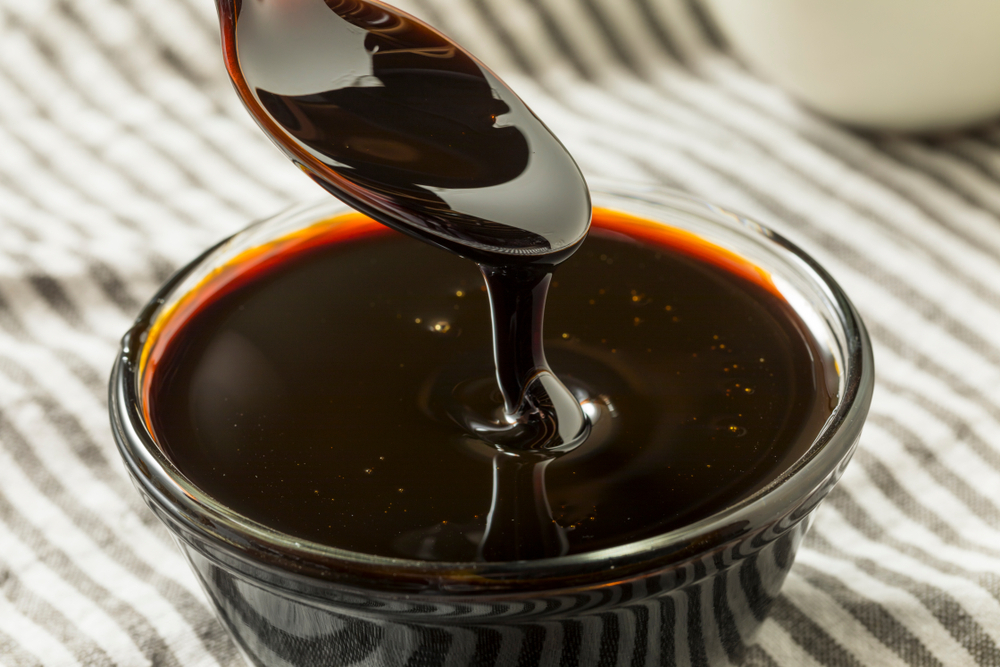Molasses is a thick syrup by-product of the sugar-making course of. It’s generally utilized in baking and might even be present in some canine meals and treats, however is it wholesome for them?
Whereas small quantities of blackstrap molasses could also be secure to supply canine, it’s not a wholesome addition to their weight loss plan. For those who’re going to make do-it-yourself canine treats with this ingredient, we advocate talking to your veterinary crew beforehand to get the inexperienced gentle from them, as its excessive sugar content material makes molasses unsuitable for all canine.
Preserve studying to be taught extra about molasses and the dangers concerned in providing it to your canine.


What Are the Three Kinds of Molasses?
There are three most important varieties of molasses that fluctuate in taste, sugar content material, and consistency.
Gentle molasses is constituted of the primary boiling of the cane or beet juice. It’s the lightest in shade and the sweetest sort, as solely a tiny share of the sugar is extracted because it doesn’t have time to boil down. It’s generally utilized in baking.
Darkish molasses outcomes from the second boiling of the cane or beet juice. It’s thicker, darker, and fewer candy than the sunshine selection. It may be utilized in baked items, however it does lend a particular shade and flavoring.
Blackstrap molasses outcomes from the third boiling. It’s the thickest and darkest molasses and lends a bitter style. That is essentially the most concentrated type of molasses, providing some nutritional vitamins and minerals and the bottom sugar content material of all kinds.


Ought to Canines Eat Molasses?
Molasses—the sunshine or darkish varieties—shouldn’t be provided to your pets straight from the container as they’re simply too excessive in sugar.
You might discover blackstrap molasses-containing canine meals, treats, and do-it-yourself pet meals recipes, and in tiny portions, it could be acceptable to supply such meals to your pets. Nonetheless, it’s vital to do not forget that molasses continues to be a type of sugar, and canine that overeat sugar are at high risk of gaining weight and growing obesity-related situations.


Risks of Feeding Molasses to Canines
Excessive Sugar Content material
Molasses may have differing quantities of sugar relying on the tactic of extraction and the age of the plant. All three sorts comprise a number of sugar, although the blackstrap selection has a lot much less.
Whereas sugar isn’t poisonous, extra sugar in a canine’s weight loss plan can upset the stability of micro organism they should digest their meals, inflicting gastrointestinal upset. An excessive amount of sugar can even result in extra energy and weight problems, which in flip can improve the chance of joint issues, pancreatitis, and cancer.
Molasses’ excessive sugar content material can even spike blood sugar ranges, so canine with diabetes ought to keep away from this meals utterly.
Potential for Xylitol
Some molasses recipes could comprise traces of xylitol. Xylitol is a typical synthetic sweetener that’s poisonous for canine. Even ingesting a small quantity of the sweetener might be deadly to your pup.


Acrylamide Content material
Blackstrap molasses accommodates acrylamide, a suspected carcinogen that may type in some plant-based meals after they’re uncovered to excessive temperatures throughout cooking. Whereas there aren’t any research explicitly specializing in canine and their danger of most cancers when consuming acrylamide-containing meals, there are research that counsel excessive does trigger most cancers in rodents. Acrylamide might be discovered in lots of industrial dry canine meals because of the high-temperature cooking strategies used.
Choking Hazard
Molasses is a thick and really gooey substance. Canines consuming molasses straight from the container could also be vulnerable to choking because of it getting caught within the airway.
Advantages of Feeding Molasses to Canines
As we talked about above, blackstrap molasses accommodates some nutritional vitamins and minerals that could be helpful for canine. It’s naturally wealthy in iron, calcium, magnesium, and vitamin B6, all vitamins your pup requires for physique processes equivalent to oxygen transportation, bone and enamel well being, and the creation of neurotransmitters.
Nonetheless, your pet ought to get the majority of their vitamins from commercially ready pet food or a recipe from a Board Certified Veterinary Nutritionist. By no means depend on meals like molasses to satisfy your canine’s dietary wants.


Conclusion
Molasses isn’t a poisonous meals for canine, however that doesn’t imply that it’s one thing you ought to be providing to them typically, both. The excessive sugar content material of sunshine and darkish varieties makes them inappropriate for on a regular basis use, however it ought to be okay to offer blackstrap molasses-containing meals and do-it-yourself deal with recipes often as long as the majority of your pet’s weight loss plan is coming from commercially ready pet food. Learn the label earlier than making any recipes with molasses to make sure they do not contain xylitol.
Converse together with your veterinary crew earlier than giving molasses to your canine, particularly if they’ve well being situations like diabetes or produce other dietary issues.
Featured Picture Credit score: Dmytro Zinkevych, Shutterstock
